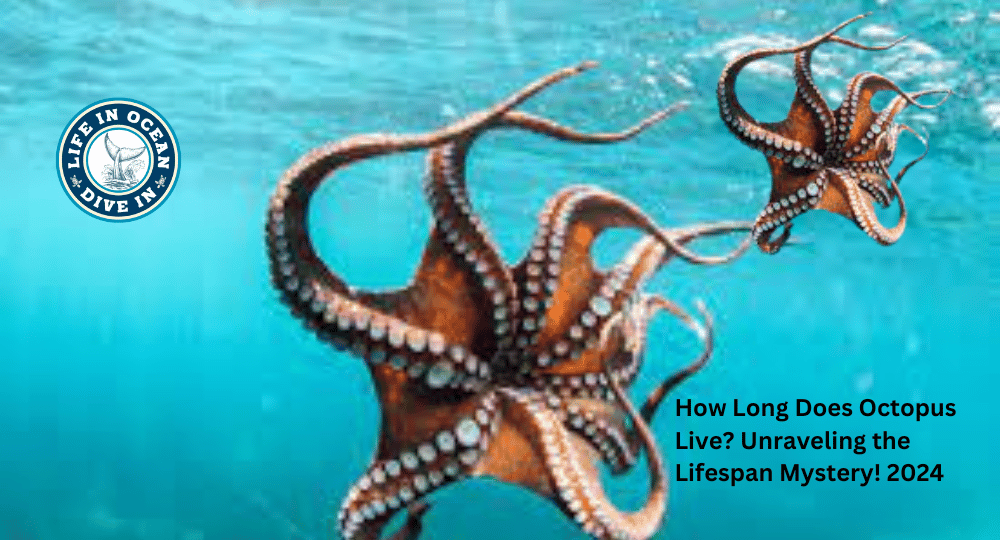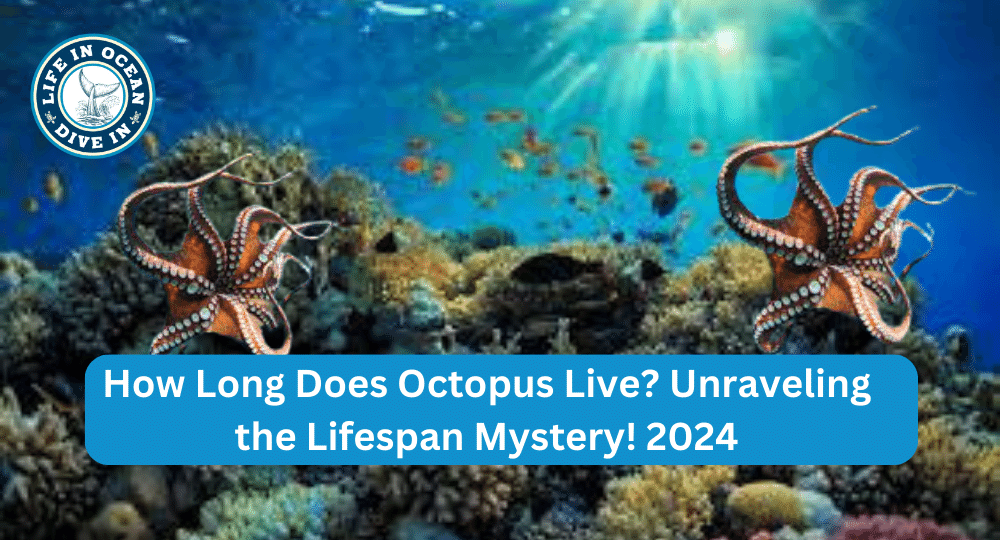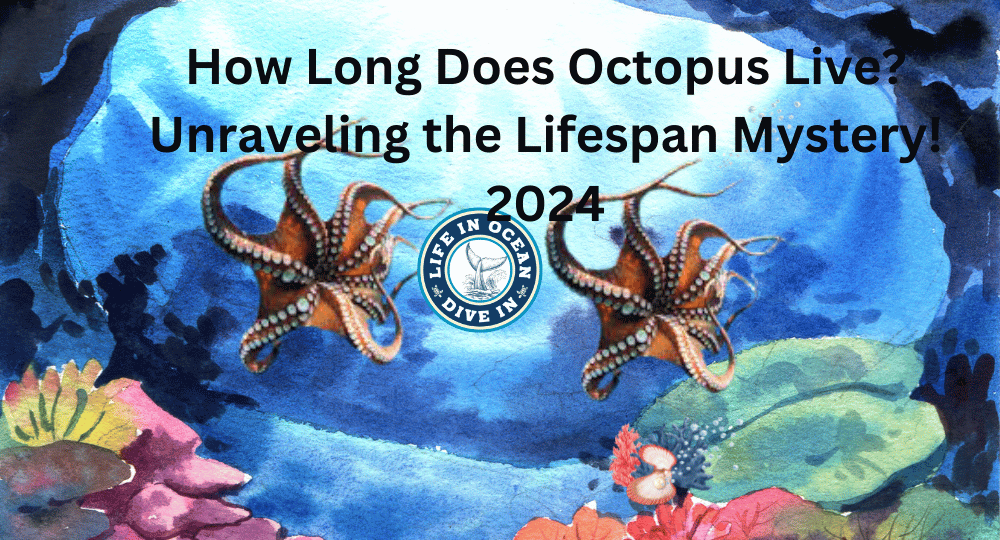Octopuses, also known as octopi, are fascinating cephalopods that have captivated the interest of scientists and nature enthusiasts due to their unique characteristics. These intelligent invertebrates are a captivating part of sea life. With their remarkable adaptability, intelligent animals continue to fascinate researchers studying sea life and invertebrates. But have you ever wondered about their lifespan? How long does octopus live actually?
Octopuses can live for different amounts of time depending on the kind of octopus and where they live. Some octopuses only live for a year or two, while others can live for several years. For example, the giant Pacific octopus can live up to five years. Scientists have studied octopuses to learn about their lifespan and mating habits. They found that things like temperature, water quality, food, and mating experiences affect how long an octopus will live and mate. These things are important for the octopus’s health.
Table of Contents
What Is an Octopus?
Octopuses are fascinating creatures that belong to the cephalopod family, along with squids and cuttlefish. These creatures have incredible abilities to adapt and survive in water. Their bodies are unique, with multiple arms and a soft body. Octopuses have blue blood, which is a result of their copper-based blood pigment. These creatures have incredible abilities to adapt and survive in water. Their bodies are unique, with multiple arms and a soft body. Octopuses have blue blood, which is a result of their copper-based blood pigment. These deep sea octopi, such as the common octopus (Octopus vulgaris), have unique characteristics that set them apart from other animals in the ocean. Let’s dive deeper into what makes octopuses so intriguing.
Soft Bodies and Bulbous Heads
Octopuses have soft bodies and live in water. They don’t have a skeleton, but their bodies are filled with blood. The common octopus, also called Octopus vulgaris, is really good at living in the ocean. It can fit through small spaces and move easily in water, showing how agile it is. Octopuses also have big heads that hold their smart brains. These brains control their heart, blood, and water balance. Their brains are really complex and help them solve problems and adapt to different situations. They can learn from experience, figure out puzzles, and even use tools to get food. Their blood is important for their survival because it helps them adjust to different temperatures.
Eight Arms with Suction Cups
The octopus has eight arms with suction cups. These arms help the octopus move, catch food, and protect itself. The octopus has blue blood that flows through its body. Its heart is in its head and pumps the blue blood to all its organs. The arms are important for many things like grabbing things, keeping the right temperature, and getting enough oxygen. The suction cups on the arms can feel touch, taste, and temperature. They also help the octopus sense water, blood, and oxygen. The arms are very flexible and can reach into small spaces or hold onto prey tightly. They can work well in different temperatures and environments.
Adaptability and Camouflage
Octopuses are really good at hiding. They can change their color to match their surroundings using special skin cells called chromatophores. These cells can change color based on things like blood, water, temperature, and oxygen. This helps the octopuses hide from predators and catch their prey. Some octopuses can even mimic other animals or objects to blend in better. For example, the mimic octopus can look like a lionfish or a flatfish to stay safe in the water.
Lifespan and Reproduction
The lifespan of an octopus varies depending on the species. Octopuses need water and oxygen to stay alive. Their blood helps deliver oxygen throughout their bodies. Some octopuses live for a few months, while others can survive for years depending on their blood, water, and oxygen. For example, the giant Pacific octopus usually lives for three to five years in water. It uses its blood to carry oxygen around its body. Octopuses have a special way of reproducing. Females lay lots of eggs and take care of them until they hatch.

This makes sure the next generation survives because the eggs need water, blood, and oxygen to grow properly. During this time, the female octopus uses all her energy to protect and care for her eggs without eating. This is very important for the eggs because they depend on the mother’s blood supply for oxygen-rich water..r Once the baby octopuses hatch from their eggs, they must rely on the water around them to survive and find food. In order to function properly, their blood needs oxygen, which they obtain from the water.
Octopus Life Cycle
Octopuses have a cool life cycle. First, the mom lays blood-filled eggs in a safe place and takes care of them, ensuring they receive enough oxygen. When the eggs hatch, tiny baby octopuses with blood and oxygen float around in the ocean like plankton. They grow and shed their skin many times. Then they settle on the ocean floor and become adults, absorbing oxygen through their gills and circulating blood throughout their bodies. Adult octopuses are really smart and can solve problems and escape from things. They have a specialized circulatory system that efficiently transports blood and oxygen throughout their bodies.
They have a specialized circulatory system that efficiently transports blood and oxygen throughout their bodies. They have three hearts to help pump blood and oxygen in different water environments. The growth of octopuses varies based on their species, influenced by factors such as blood and oxygen. Once an adult female octopus has babies, she usually dies soon after due to exhaustion or aging, as her blood and oxygen supply may become depleted.
Octopus Lifespan
The lifespan of an octopus can vary greatly depending on the species. Octopuses have blue blood and use gills to extract oxygen from water. Octopuses have blue blood and use gills to extract oxygen from water. Some species have a relatively short lifespan, living only for a few months, while others can survive for several years. The lifespan of these species depends on factors such as blood and oxygen. The lifespan of these species depends on factors such as blood and oxygen. The average lifespan of an octopus is influenced by various factors, including habitat conditions, predation, and the oxygen level in their blood.
Variability in Lifespan
Octopuses are fascinating creatures with diverse lifespans. For instance, the common octopus (Octopus vulgaris) typically lives for about one to two years, relying on its blood to carry oxygen throughout its body. On the other hand, the giant Pacific octopus (Enteroctopus dofleini) has a longer lifespan and can survive up to five years or more by efficiently circulating blood and oxygen. This variation in lifespans among different species is due to their unique biological characteristics, such as blood composition and oxygen levels, and environmental factors.
Factors Influencing Lifespan
Habitat conditions affect an octopus’s lifespan. Octopuses in shallow waters have shorter lives because there is less oxygen in the water and their blood doesn’t circulate as well. These octopuses also face more risks from predators and changes in temperature and saltiness. They rely on their blood to get oxygen, which makes them vulnerable. Predators also affect an octopus’s lifespan. Octopuses use tricks like hiding and swimming fast to avoid becoming prey. They do this by using oxygen efficiently. But even with these tricks, many octopuses still get eaten by bigger predators because they don’t have enough oxygen.
Reproductive Lifecycle Impact
An octopus’s lifespan is affected by its reproductive cycle, which depends on oxygen availability. Octopuses focus more on making babies than staying alive. They have special ways to get oxygen from water, which helps them reproduce. After mating, females lay eggs and protect them until they hatch. This requires enough oxygen for the eggs to grow properly. Females stop eating and only take care of the eggs. This ensures the embryos get enough oxygen to grow well.
This reproductive effort takes a toll on the female octopus’s health, often leading to her death shortly after the eggs hatch due to a lack of oxygen. This phenomenon, known as semelparity or “one-time reproduction,” is observed in many octopus species and is influenced by the availability of oxygen. It contributes to their relatively short lifespans.
Examples of Long-Lived Octopuses
While some species have shorter lifespans, there are exceptions where certain octopuses can live for an extended period due to the availability of oxygen. The aforementioned giant Pacific octopus is one such example. The deep-sea-dwelling Graneledone boreopacifica has been found to have a lifespan of up to five years or more, relying on oxygen for survival.
Factors Affecting Octopus Lifespan
Environmental Factors Impacting Octopus Lifespan
An octopus’s lifespan can be affected by things like oxygen and food. Octopuses are cold-blooded, so their body temperature matches their surroundings. This helps them get oxygen from the water. When it’s warmer, they use more oxygen and may not live as long. Octopuses also need enough food to stay healthy. If they don’t have enough food, they can get sick and die sooner.
Predators and Octopus Lifespan
Predators are a big deal for octopuses. They have to be careful because lots of other animals want to eat them. If there are more predators around, octopuses won’t live as long. Octopuses have some cool ways to protect themselves, like blending in with their surroundings. But even with these tricks, predators can still cut their lives short.
Reproduction and its Impact on Lifespan
When female octopuses lay eggs, they stop eating and only care for the eggs until they hatch. This puts a lot of strain on their bodies. After the eggs hatch, the female octopus becomes weak and many of them die. They sacrifice themselves to take care of their babies, but it makes their own lives shorter.
Longest-Lived Octopus Species
The giant Pacific octopus takes the crown for being one of the longest-lived species in the world. These incredible creatures have an impressive lifespan, often reaching up to five years or even longer under favorable conditions. Their slow growth rate contributes significantly to their extended time on this planet.
The Giant Pacific Octopus
The giant Pacific octopus (Enteroctopus dofleini) is a remarkable creature found in the northern Pacific Ocean, primarily along the coasts of California, Alaska, and Japan. They are known for their immense size and intelligence, making them a fascinating subject of study for marine biologists.
A Record-Breaking Lifespan
Octopuses generally have relatively short lifespans compared to other animals. However, the giant Pacific octopus defies this trend by living considerably longer than its counterparts. While most octopuses live between one and two years, these giants can survive for several years.
Factors Contributing to Their Longevity
Several factors contribute to the extended lifespan of giant Pacific octopuses:
- Slow Growth Rate: Unlike many other marine species that grow rapidly during their early stages of life, giant Pacific octopuses have a slow growth rate. This slower growth allows them to conserve energy and allocate resources more efficiently throughout their lives.
- Reduced Predation Risk: As they grow larger and stronger with age, giant Pacific octopuses become less susceptible to predation from other marine creatures. Their size acts as a deterrent against potential predators, increasing their chances of survival over an extended period.
- Adaptability: These intelligent creatures possess excellent problem-solving skills and adaptability, allowing them to navigate challenging environments effectively. Their ability to adjust to different conditions enhances their overall survival rate.
- Habitat Selection: Giant Pacific octopuses are selective about their habitats and tend to settle in areas that offer optimal conditions for their survival. They choose locations with abundant food sources, suitable temperature ranges, and adequate shelter, ensuring their long-term well-being.
The Importance of Conservation
Understanding the factors that contribute to the longevity of giant Pacific octopuses highlights the significance of protecting these incredible creatures and their habitats. By preserving their natural environments and implementing sustainable fishing practices, we can help ensure the continued existence of this species for future generations to appreciate.
Shortest-Lived Octopus Species
Octopuses are cool creatures with different lifespans. The paper nautilus is one kind that doesn’t live very long, usually only six to twelve months. They have a short life because they have babies and then leave them alone. They also get eaten a lot because they don’t have good ways to protect themselves. But even though they don’t live long, they still matter in the ocean’s food chain. Scientists at places like MBL study them to learn more about marine life.
How Long Does Octopus Live? Final Words
So, there you have it! We’ve explored the fascinating world of octopuses and uncovered some incredible facts about their lifespan. From learning about the different species to understanding the factors that influence their longevity, we now know just how long these mysterious creatures can live.

But what does this mean for you? Well, if you’re thinking about getting an octopus as a pet, it’s important to consider their lifespan. Some species can live for several years, while others have a much shorter time on this Earth. Understanding their needs and providing them with a suitable environment is crucial to ensuring they thrive.
In conclusion (oops, sorry for using that phrase), octopuses are truly remarkable creatures with diverse lifespans. As responsible humans sharing this planet, let’s continue to learn more about these intelligent beings and work towards protecting their habitats. So go ahead, dive into the world of octopuses and marvel at the wonders of nature!
PS: If you’re interested in learning more about marine life or want to discover other curious animals, check out our blog for more exciting articles!
FAQs
How long do octopuses live?
Octopuses are fascinating creatures with varying lifespans depending on the species. On average, most octopuses live for about 1-2 years, but some can live up to 5 years or even longer! However, there are a few exceptions that prove just how extraordinary these animals can be.
What factors influence an octopus’s lifespan?
Several factors contribute to an octopus’s lifespan. One crucial factor is the species itself. Different species have different lifespans, ranging from a few months to several years. Another significant factor is environmental conditions. Octopuses living in favorable habitats with ample food supply and suitable water conditions tend to have longer lifespans.
Are there any exceptions to the typical lifespan of an octopus?
Yes! There are exceptional cases where certain species of octopuses defy expectations and live significantly longer than their counterparts. For example, the Giant Pacific Octopus has been known to survive for up to five years or more, showcasing their incredible resilience and adaptability.
Can an octopus die after reproducing?
Yes, sadly, some octopuses pass away shortly after reproducing. This phenomenon is known as “semelparity,” where an organism reproduces only once in its lifetime before dying. After laying eggs and caring for them meticulously until they hatch, female octopuses may experience a decline in health and energy levels which ultimately leads to their demise.

How does the lifespan of an octopus compare to other marine animals?
Compared to many other marine animals like fish or whales that can live for decades or even centuries, the lifespan of an average octopus may seem relatively short. However, it’s important not to underestimate the richness of experiences packed into those precious years. Octopuses lead adventurous lives full of learning, problem-solving, and exploring their surroundings.
If you’re curious about these captivating creatures’ lifespans, take a deep dive into the world of octopuses and discover more about their remarkable abilities and intriguing behavior.

